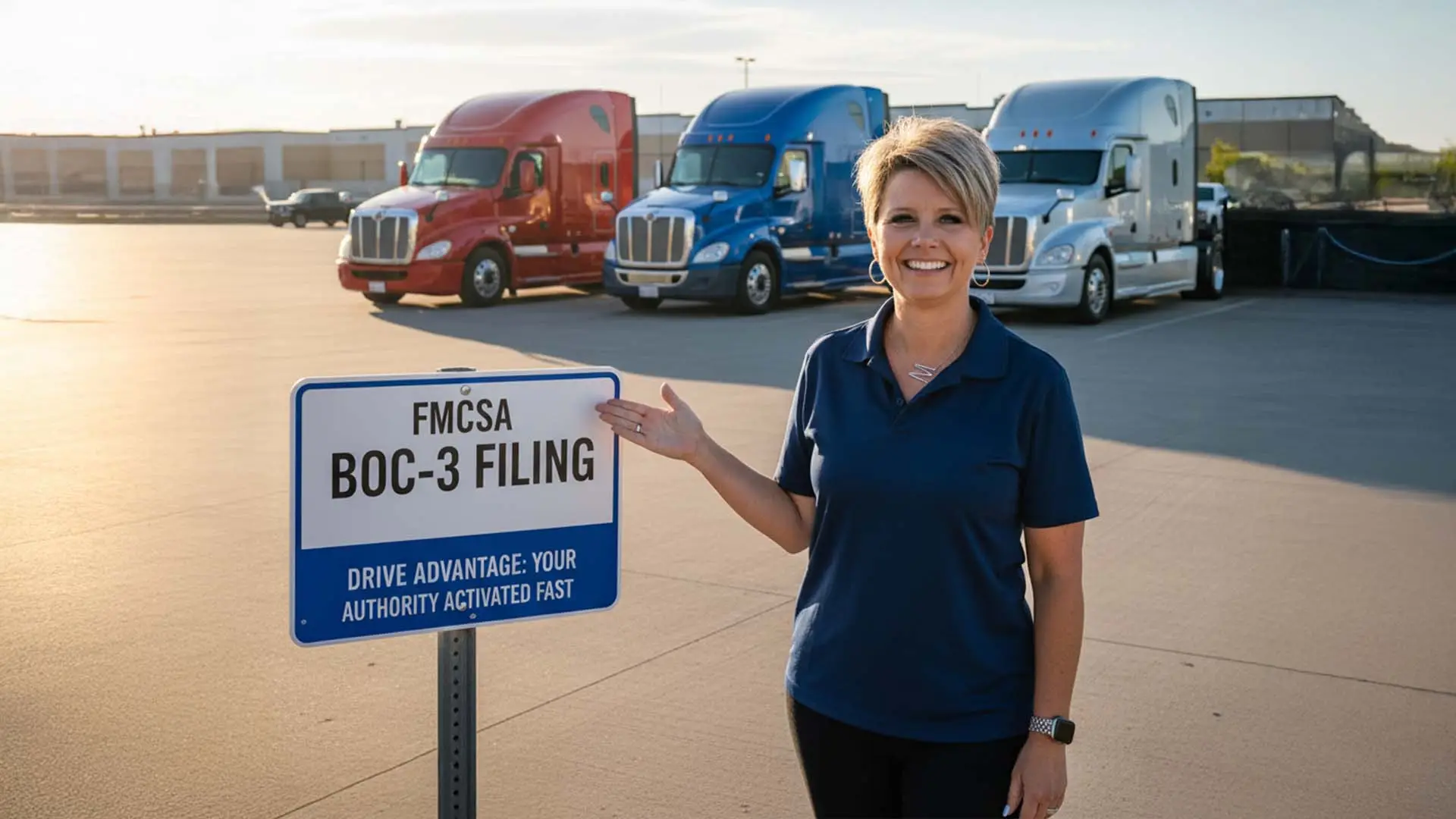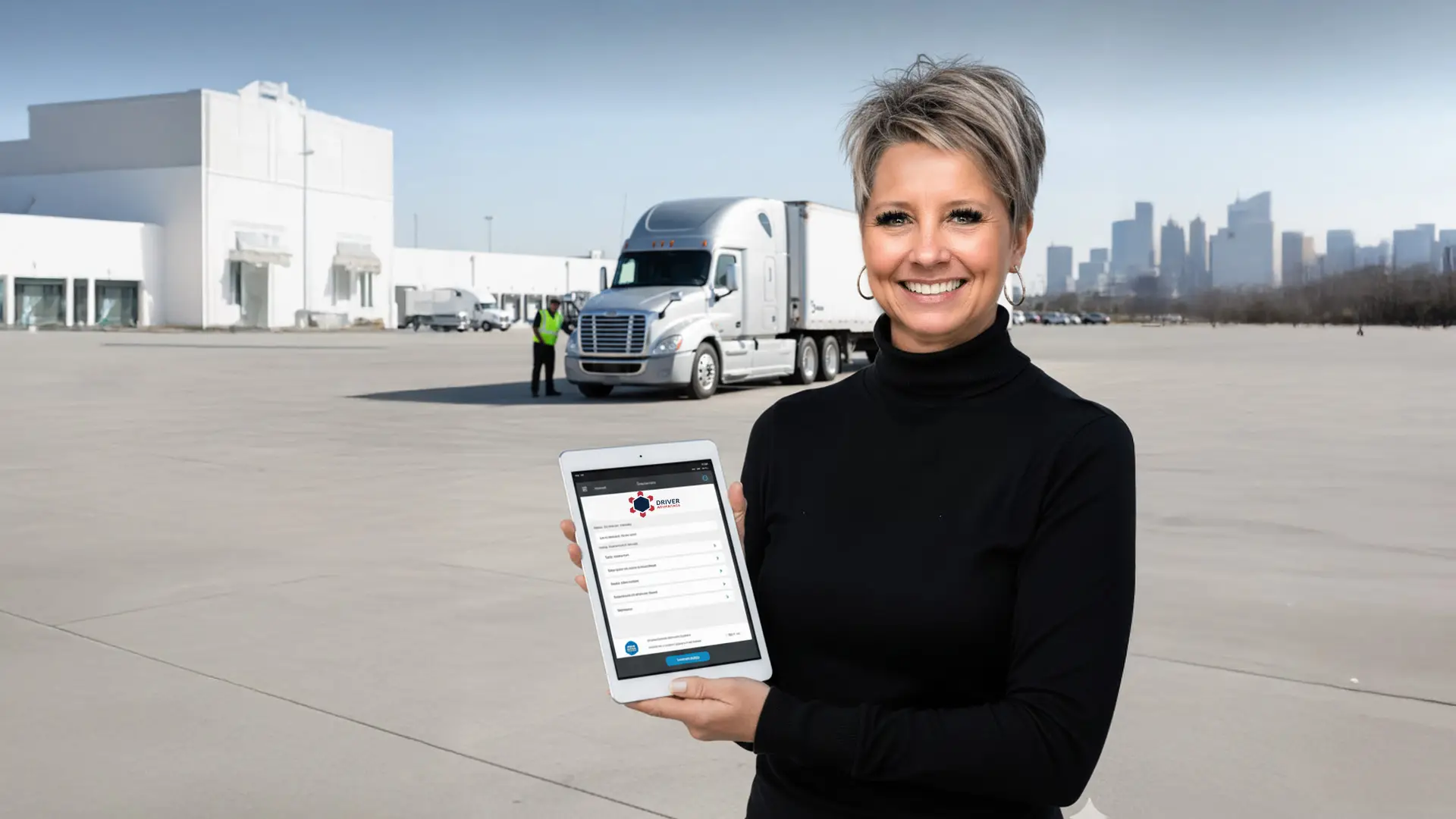Launching your own trucking authority involves navigating several FMCSA requirements, and one crucial step is filing a BOC-3 form. This process often frustrates new drivers due to the paperwork and legal jargon. In this guide, we break down what a BOC-3 filing is, why you need it to activate your authority, and how to file a BOC-3 with minimal hassle. We’ll also explain how Driver Advantage can help you file your BOC-3 quickly (and handle other authority steps) so you can hit the road faster.
What Is a BOC-3 Filing and Why Do You Need It?
A BOC-3 is a form that designates process agents in each state to accept legal documents on behalf of your trucking company. In fact, “BOC” stands for Blanket of Coverage – it’s essentially proof that you have a representative available in every state where you operate. These agents are needed in case your company is served with court papers or official notices while you’re out on the road. In other words, a BOC-3 filing ensures there’s always a reliable contact to receive legal documents for your business, which is vital for compliance and legal protection.
All for-hire motor carriers, brokers, and freight forwarders are required to file a BOC-3 as part of obtaining interstate operating authority. If you’re pursuing a new trucking authority, filing Form BOC-3 is not optional – it’s a mandatory FMCSA step just like getting your USDOT and MC numbers. Without a BOC-3 on record, the FMCSA will not activate your authority. In fact, the BOC-3 must be on file before your MC number becomes active, or your authority application can be dismissed by FMCSA. (This is a common reason new carriers get delayed: forgetting to file the BOC-3 in time.) Additionally, once you file it, keep a copy of the BOC-3 form at your principal place of business as proof that you’ve designated process agents as required.
Why do truckers need a BOC-3? It comes down to legal accessibility. When you’re frequently on the move, regulators and courts need a fixed contact to reach your company. The BOC-3 process agent serves as that fixed point of contact. FMCSA regulations (49 CFR 366) mandate that only a certified process agent can file Form BOC-3 on behalf of a motor carrier. (If you’re a broker without commercial vehicles, you’re allowed to file it yourself, but carriers who drive trucks must use a process agent.) This rule is in place to ensure professional handling of legal documents and to maintain an unbroken line of communication with motor carriers. Essentially, filing a BOC-3 is one of the final hurdles to jump before you can fully activate your interstate operating authority, alongside securing insurance and other requirements.
How to File a BOC-3 for Your New Trucking Authority
Filing a BOC-3 may sound complicated, but it’s actually a straightforward process when you know the steps. Below is a step-by-step look at the BOC-3 filing process with FMCSA for new carriers:
- Choose an FMCSA-Approved Process Agent Service: Since you (as a carrier) cannot file the BOC-3 form on your own, your first step is to select a process agent or BOC-3 filing service authorized by FMCSA. Many companies offer “blanket agent” service, meaning they have agents in all 50 states so you don’t have to appoint separate agents individually. Look for a reputable service that specializes in FMCSA filings – this could be an authority filing company, a trucking association, or a compliance service (for example, Driver Advantage or others who handle new authority setup).
- Provide Your Business Details: Once you’ve chosen a service, you’ll need to give them some basic information to prepare your BOC-3 form for your new authority. Typically, you’ll provide your legal business name, address, and your DOT/MC number (if already issued). The process agent service will use this info to fill out Form BOC-3, listing all the states and the designated agents’ addresses for each. Fortunately, most BOC-3 filings can be done online – you might just fill out a short form or make a quick call, and the service handles the rest electronically.
- The Process Agent Files Form BOC-3 with FMCSA: After collecting your info, the process agent will file the BOC-3 form on your behalf. They typically submit it electronically through the FMCSA system. Only one completed form can be on file, and it must cover all states where you’ll operate. The filing is usually quick – often processed within 1 business day. (FMCSA does not charge a fee for BOC-3 filing itself, but the process agent service will usually charge you a small fee for their service.) Once filed, you’re officially on record with a process agent in each state. This fulfills the BOC-3 requirement.
- Confirm Your Authority Activation: With your BOC-3 submitted, you’ve cleared a major requirement for activating your authority. You should verify that FMCSA has received and approved your BOC-3. Most process agents will send you a confirmation or a copy of the filed form. Keep this for your records at your principal place of business. Now, the remaining piece to activate your trucking authority is making sure your insurance is also on file (more on that below). FMCSA typically won’t grant your authority until both BOC-3 and insurance filings are in place.
- Maintain and Update as Needed: After you’re up and running, remember that your BOC-3 designation should be kept up to date. If you change your process agent or the agents’ addresses, you’ll need to re-file an updated BOC-3. You only ever have one active BOC-3 form on file, but you can amend it if your coverage or operation expands to new states. Also, if you go out of business or temporarily deactivate your authority, the BOC-3 becomes inactive; you’d file a new one if you restart operations. Most importantly, always ensure you have a current process agent in every state you run freight – it’s an ongoing compliance obligation, not a one-time task.
BOC-3 and Other FMCSA Authority Requirements (Don’t Forget Insurance!)
Filing the BOC-3 is just one step in the process of getting your FMCSA operating authority active. To avoid any surprises, make sure you handle these other key requirements for a new authority:
- Insurance (BMC-91 filing): Proof of liability insurance must be filed with FMCSA by your insurance company. FMCSA will not grant operating authority until the minimum required insurance is on file. Right after you receive your MC number, contact your truck insurance provider to bind a policy and have them submit Form BMC-91/91X electronically to FMCSA. If you fail to get your insurance filing in within the allowed time (usually within 20–30 days of your application’s publication), FMCSA will issue a warning and then dismiss your authority application if insurance isn’t filed in time. In short, getting insurance is the next critical step after your BOC-3. (Most new carriers arrange insurance concurrently while the BOC-3 is being filed, to speed up activation.)
- UCR (Unified Carrier Registration): All interstate trucking companies must register annually under UCR. This is a fee-based registration that covers your entire fleet. It’s required by law once you have an active USDOT/MC, though it doesn’t prevent activation of your authority if not done immediately. Be sure to complete UCR for the current year as soon as your authority is granted (or in the fourth quarter for the upcoming year) to stay compliant
- HVUT (Heavy Vehicle Use Tax Form 2290): If your trucks have a gross weight of 55,000 lbs or more, you need to file Form 2290 and pay the Heavy Vehicle Use Tax each year. For a new authority, you’ll want to file this if applicable to get your stamped Schedule 1 (especially before registering your vehicle plates).
- State-Specific Permits: Depending on your base state and where you haul, you might need extra permits like KYU number (Kentucky weight distance), New York HUT, New Mexico weight distance, Oregon permit, etc. These are not part of FMCSA authority, but they can be required before you operate in those states. Check if any states you travel through require additional credentials as you set up your operation.
- DOT Compliance Requirements: Don’t overlook things like enrolling in a drug & alcohol testing program (if you operate CDL-required vehicles), obtaining an IFTA fuel tax license for your truck, and preparing a Driver Qualification File for any drivers (including yourself). While these steps aren’t filings for authority per se, they are part of being fully compliant as a new carrier. The FMCSA New Entrant Program will audit you within your first 18 months, so it’s best to have all these ducks in a row from the start.
As you can see, activating a new trucking authority involves multiple filings and registrations. The BOC-3 and insurance filings are the two that directly determine when your interstate authority goes live. Handle those promptly so your MC number can become active without delay. Many new drivers feel overwhelmed by this list of tasks, but that’s where a service like DriverAdvantage can really make a difference – by simplifying and speeding up the process for you.
How DriverAdvantage Helps You File BOC-3 Fast (and Get On the Road)
Driver Advantage is a company that specializes in new trucking authority setup, and they offer hands-on help to get your authority active quickly. If all this talk of forms and filings seems like a headache, you’re not alone – many drivers get frustrated by the red tape and just want to drive. Driver Advantage steps in as a one-stop solution: they take care of the paperwork, ensure you meet every requirement, and act as your guide through the process. In the context of BOC-3 filing, Driver Advantage provides a fast and hassle-free service to handle it on your behalf. Here’s how DriverAdvantage can make your BOC-3 filing (and authority activation) easy:
- Complete BOC-3 Filing Service: Driver Advantage will handle your entire BOC-3 filing, acting as your blanket process agent for all states. They prepare and submit the Form BOC-3 for you, designating a process agent in each state where you operate so you don’t have to worry about it. This ensures your BOC-3 is filed correctly and promptly in compliance with federal regulations.
- Speed and Efficiency: Time is money when you’re waiting to start hauling loads. Driver Advantage understands this, so they expedite your filings to minimize downtime and get you on the road sooner. Their team knows the FMCSA procedures inside out, which helps avoid delays. Instead of navigating the FMCSA website or mailing forms, you can rely on Driver Advantage’s electronic filing process to file your BOC-3 fast – often within the same day.
- Insurance and Authority Activation Support: Beyond the BOC-3, Driver Advantage helps with the other critical step – insurance filing. They will guide you through getting the proper insurance coverage and ensure your insurer submits the needed forms (BMC-91) to FMCSA. In fact, their authority packages cover everything from MC number application through BOC-3 and insurance, all the way to final activation confirmation. This comprehensive approach means you won’t miss any required filings. By having an expert coordinate BOC-3 and insurance filings together, you can often shave days or weeks off the wait for authority approval.
- Skip the Paperwork Headaches: One of Driver Advantage’s mottos is “Skip the paperwork headaches – our experts handle everything from start to finish”. When you sign up for their authority filing service, you essentially hand over a stack of chores: DOT/MC applications, BOC-3, UCR, IFTA, 2290, etc. Their compliance specialists prepare and submit all documents on your behalf. This is a huge stress relief if forms and legal language aren’t your strong suit. It also eliminates mistakes that could cost you time – with professionals handling it, there’s less risk of an error that could result in FMCSA rejecting a filing.
- Ensured Compliance (Avoid Fines and Delays): Because Driver Advantage’s team are experts in FMCSA rules and trucking compliance, they make sure you meet all requirements properly to avoid any fines or penalties. Missing a filing or doing it incorrectly can lead to costly fines or your authority being delayed/suspended. With Driver Advantage, you get peace of mind that nothing is overlooked – from having the correct process agent in every state to keeping your records in order. They even stay up-to-date on regulation changes and can inform you if something new is required, helping you stay compliant long-term.
In summary, Driver Advantage streamlines the entire new authority process, with BOC-3 filing being one of their core services. They act like your personal authority concierge: you focus on planning your business and driving, while they handle the bureaucratic maze. For drivers who value their time and want to avoid frustration, using a service like this can be a smart investment. DriverAdvantage’s goal is to get your authority active fast and correctly, so you can start hauling legally and earning money without unnecessary waiting. As they highlight, obtaining your trucking authority can actually be smooth and efficient when professionals guide you.
Key Takeaway
Filing a BOC-3 for trucking authority is an essential step that every new carrier must complete. It doesn’t have to be painful or confusing. Remember these main points:
- The BOC-3 form designates process agents in all states you operate – it’s required by FMCSA for all carriers before your authority becomes active.
- You can’t file BOC-3 yourself (if you’re a motor carrier); you’ll use an FMCSA-approved process agent or service to file it. Many services allow you to file BOC-3 online easily through a simple form and will get it done quickly.
- File the BOC-3 as soon as possible after getting your MC number. Along with obtaining insurance, this filing is necessary to activate your trucking authority. Delaying it can cause your authority grant to be postponed or dismissed.
- Keep a copy of your BOC-3 at your principal place of business and stay on top of any updates (if you change agents or expand operations).
- If the process is overwhelming, consider a comprehensive authority filing service like Driver Advantage. They can file the BOC-3, handle insurance, and take care of all other authority requirements for you. This support can save you time, ensure everything is done right, and let you focus on driving and making your business profitable.
Getting your own authority is a big step toward independence in the trucking industry. With the right help and understanding of the process, you can cut through the red tape. By handling the BOC-3 filing and other key steps properly, you’ll be on the road with your new authority before you know it. Good luck, drive safe, and remember that Driver Advantage is ready to assist if you need experts to file fast and get you moving!



